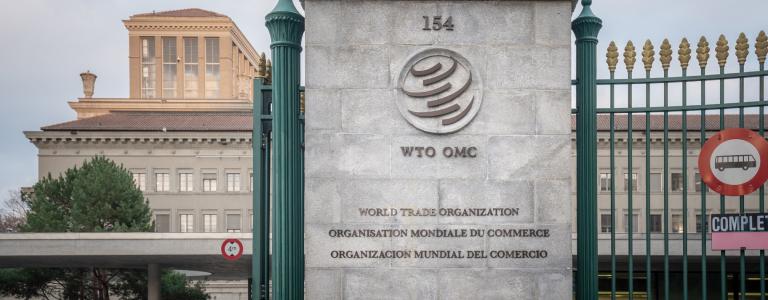IISD at the WTO's Trade and Environment Week 2022
IISD participated in the 2022 edition of the World Trade Organization’s (WTO) Trade and Environment Week, which took place from October 17 to 21, 2022, both in-person in Geneva and online via Zoom.
The event brought together the community working on issues at the trade and environment nexus, from government officials and intergovernmental organization representatives to civil society and academia, to take stock of the latest trends, opportunities, and challenges in this field and what it will take to achieve a more environmentally sustainable approach to global trade.
IISD Organized & Co-Organized Events
Trade and Climate Change Adaptation
Wednesday, October 19, 2022, 1:15–2:45 p.m. Geneva time
Together with the Pacific Islands Forum Secretariat, IISD co-organized this session to look closely at the role of trade policy in supporting climate change adaptation, along with what we can learn from adaptation planning efforts to date and how this can inform our understanding of trade policy’s role.
Climate change is already reshaping our world, but its impacts on different regions vary. It is also posing new challenges to the global economy and is changing previous patterns of international trade. For instance, extreme weather events can severely damage infrastructure, temporarily or permanently cutting communities and countries off from trade opportunities. Gradual temperature rise can make agricultural trade more volatile, such as by increasing the risk of crops failing simultaneously, while also disrupting international shipping routes and the marine environment, thus reshaping the tourism sector.
While climate change will clearly drive changes in international trade, international trade also has a role to play in efforts to adapt to climate change. This discussion is still nascent and demands a closer look at climate change’s various impacts in different parts of the world, along with a deeper understanding of how adaptation takes place in practice. This session brought these policy fields together, looking at what we can learn from countries’ experiences with national adaptation planning, such as adaptation needs in developing and emerging economies, and how trade can help.
Speakers included:
- Alice Tipping, Lead, Sustainable Trade, IISD (moderator)
- Ambassador Nella Pepe Tavita-Levy, Permanent Representative of Samoa to the World Trade Organization
- Anne Hammill, Senior Director, Resilience, IISD
- Joel Richards, Senior Technical Specialist, the OECS Geneva Mission
- Dr. Fahmida Khatun, Executive Director, Centre for Policy Dialogue
The WTO Fisheries Subsidies Agreement: From words to action
Thursday, October 20, 2022, 2:30–4:00 p.m. Geneva time
WTO members agreed at their Twelfth Ministerial Conference to a new set of binding multilateral rules to curb harmful fisheries subsidies, creating the first WTO agreement with an environmental goal. The Fisheries Subsidies Agreement aims to ensure that public funds do not support fishing activities that undermine the sustainability of marine resources and the livelihoods of fishing communities. For the agreement to achieve these objectives, WTO members must now ratify the treaty and prepare for its implementation.
This event provided a concise overview of the Fisheries Subsidies Agreement and its disciplines, after which WTO members and civil society representatives gave insights into key considerations for implementation. Finally, the event included the presentation of a self-assessment tool produced by IISD to support WTO members’ efforts to prepare for the agreement's implementation.
Speakers included:
- Alice Tipping, Lead, Sustainable Trade and Fisheries Subsidies, IISD (moderator)
- Sainabou Taal, Acting Head of Fisheries Subsidies, WTO Rules Division
- Ernesto Fernández Monge, Senior Officer, Conservation Support, The Pew Charitable Trusts
- Assan Touray, First Secretary, Permanent Mission of the Republic of The Gambia to the United Nations Office in Geneva
- Tristan Irschlinger, Policy Advisor, Fisheries Subsidies, IISD
IISD Participation
Fossil Fuel Subsidy Reform (FFSR): Challenges and opportunities in the context of an energy crisis
Tuesday October 18, 4:30–6 p.m. Geneva time
The issue of fossil fuel subsidy reform is gaining prominence in a range of international and regional forums, including at the WTO. This session explored the challenges and opportunities of advancing FFSR in the current context of high energy prices, bringing together experts in the fields of energy supply, environmental and trade policy, and development. This session was organized by the Friends of Fossil Fuel Subsidy Reform.
Speakers included:
- Toru Muta, Senior Energy Analyst, International Energy Agency
- Grégoire Garsous, Economist, Trade and Agriculture Directorate, Organisation for Economic Co-operation and Development
- Jonas Kuehl, Policy Analyst, Energy Program, IISD
- Marcel Vernooij, Deputy Permanent Representative, Permanent Mission of the Netherlands (moderator)
Additional downloads
Upcoming events
Building Bridges: The State of Nature-Based Investments
Join us for a panel at the Building Bridges conference in Geneva, Switzerland, to discuss the state-of-play of nature-based investments and the potential opportunities they present.
Through Her Lens: Women leading change in sustainable agriculture and market inclusion
Despite the critical role that women play in agricultural production, they still do not have equal access to global agricultural supply chains on terms that benefit them.
The Pivotal Role of Sustainability for Ukraine’s Reconstruction
This webinar, hosted by the International Institute for Sustainable Development and the Ukrainian Climate Office, will discuss how to incorporate sustainability into Ukraine's recovery and reconstruction plans and share recommendations for implementation.
A Municipal Perspective on the Value of Natural Infrastructure
This webinar will showcase examples the cost-effectiveness of natural infrastructure from a municipal perspective. Focusing on what municipalities need—what evidence and numbers they rely on, and what tools and planning processes are required to ensure that natural infrastructure is assessed alongside traditional infrastructure for cost-effectiveness.
